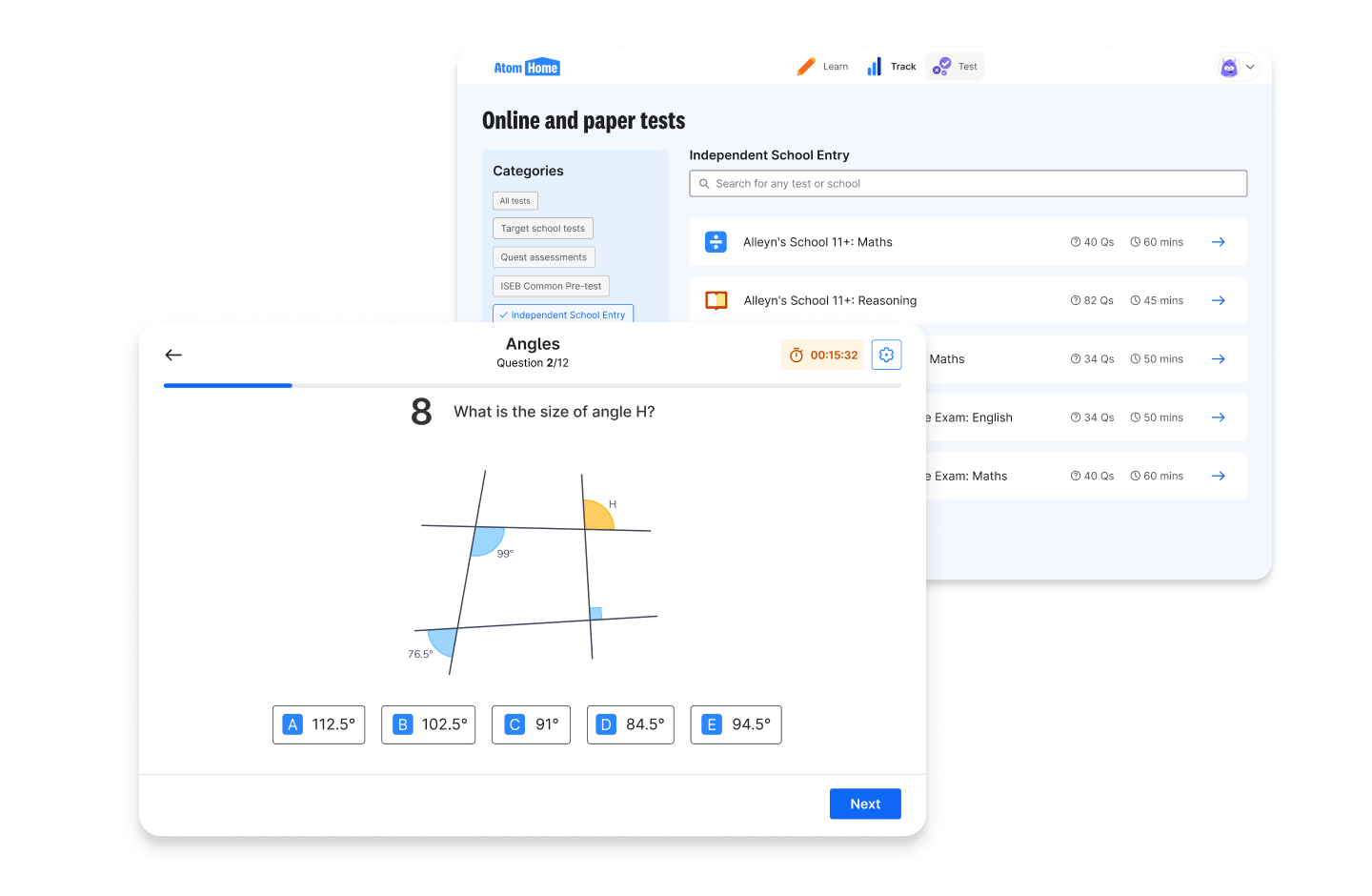Guide to independent schools

Are you considering a UK independent school education for your child? Find out everything you need to know in this guide, including:
- The origins of independent schools
- The advantages and disadvantages of independent schools
- How to apply and secure a place at an independent school
What is an independent school?
Independent schools, also known as private schools, operate outside of government funding. Instead, they are funded through tuition fees paid by families. These schools have complete control over how they are run, including the curriculum they teach, their admissions process, and the overall learning environment they create.
UK independent schools have a long history. They began in the medieval period, when education was provided by religious groups. Over time, some schools became independent from the church or government, choosing how they were run and funded. That independence still exists today. These schools manage themselves, charge fees and decide what they teach, making the name ‘independent’ just as true now as it was then.
Today, the independent school sector is diverse. It includes large day and boarding schools and smaller preparatory and specialist schools that accommodate different educational needs. While some independent schools remain single-sex, many are now co-educational.
Are independent schools free?
Independent schools in the UK are not free; they charge tuition fees to cover the cost of education, facilities, and extracurricular activities. There is no set fee, with the price varying depending on each school’s location, reputation, facilities, and whether it offers day or boarding places.
In recent years, many independent schools have been committed to widening access and providing financial assistance through scholarships and means-tested bursaries:
Independent school scholarships:
Independent school scholarships are designed to recognise and support children with exceptional talent in a particular area, such as academics, music, sport, art or drama. Each school sets its own criteria, so it’s a good idea to check the admissions section on school websites or contact schools directly to find out what’s available and how to apply.
If your child is shortlisted, they may be invited to take part in extra assessments like an exam, an audition or a practical task, depending on the type of scholarship.
If awarded a scholarship, you could receive a fee reduction. In return, your child will usually be expected to stay committed to that subject and take an active role in that part of school life.
Means-tested bursaries:
Means-tested bursaries help families with the cost of independent school fees. They provide a discount on fees, which you will not need to pay back.
To find out if you’re eligible, you’ll need to complete a financial assessment during the admissions process. This looks at things like your income, savings, and regular expenses. Some schools carry out this process themselves, while others work with external organisations to make sure it’s fair and confidential.
If you are awarded a bursary, the school will offer a fee reduction, depending on your family’s financial situation.
It’s a good idea to check your chosen schools’ websites early, as bursary deadlines can be earlier than other application stages.
How can my child get a place at an independent school?
Some independent schools are academically selective. For these schools, your child will need to take entrance exams as part of the admissions process. The 11+ is the most common entry point, but some schools also offer entry at 10+ and 13+.
It’s important to note that the 11+ for independent schools is often different from the version used by grammar schools. Each school sets its own format, and the content can vary depending on whether the school uses standardised tests or their own papers.
Independent entrance school exams:
Children usually take the entrance exam during the autumn or spring term of Year 6. The exact format varies from school to school, but most assessments cover a combination of the following subjects:
- English: This may include reading comprehension, creative writing, or both. Children are assessed on their spelling, punctuation, grammar, and vocabulary.
- Maths: Based on the Key Stage 2 national curriculum, questions test numerical reasoning and problem-solving skills.
- Verbal reasoning: Measures how well your child can understand and reason with written information, including relationships between words and logic-based questions.
- Non-verbal reasoning: Assesses your child’s ability to solve problems using visual information such as patterns, shapes, and diagrams.
Some independent schools set their own entrance exam papers, while others use standardised tests provided by external exam boards. Below are some of the most common assessment providers used for 11+ entrance exams:
Click the links to explore our detailed guides and learn more about each exam's structure, format, and content.
Is your child ready for the ISEB Pre-test?
See where they stand in minutes. Atom’s free ISEB baseline tests give you an instant breakdown of their strengths and gaps. Know exactly what to focus on next and start preparing with direction, not uncertainty.
.png)
What are the advantages of independent schools?
Personalised academic support
With smaller class sizes, teachers in independent schools can give each child more individual attention. Whether your child needs help building their confidence in a particular subject or is ready to challenge themselves, they’ll get the support they need.
Many independent schools also guide pupils through university admissions, helping them aim high and prepare for the next steps after school at top UK and international universities.
A diverse learning experience
Independent schools offer a wide curriculum and expert teaching across subjects. From early on, children can explore specialist subjects like languages, computing, and the arts.
Many schools, particularly those with boarding options, will also offer fantastic facilities, including sports halls, theatres, and music rooms. Pupils are encouraged to join clubs and extra-curricular activities, which build confidence and develop new skills outside of the classroom!
Wellbeing and wider opportunities
Pastoral care is a top priority. Children are supported not just in their learning but also in their well-being. Independent schools often have strong communities where every child feels valued and included. For families who travel often or live overseas, independent schools, particularly boarding schools, can provide children with a consistent and caring routine.
What are the disadvantages of independent schools?
Cost
Independent schools charge fees, which can make them seem out of reach for many families. The costs vary widely between different schools, with boarding schools tending to be more expensive than day schools.
However, many schools offer financial support in the form of scholarships and means-tested bursaries. These can help reduce fees significantly, or in some cases, cover them entirely.
If you’re considering independent schools, it’s worth exploring the support available and weighing the long-term benefits for your child.
High academic pressure
Independent schools often have high academic expectations. This can be a great motivator for some children, but it might feel intense for others, especially during the admissions process for selective independent schools. Preparing for multiple entrance exams, like the 11+, can feel like a lot for children.
Once enrolled, children join a learning environment focusing on achievement and individual progress. Many thrive in this setting, but others might need time and support to settle in.
That’s where Atom can help. Atom Home is designed to guide your child through their learning journey, not just to help them pass an exam, but to build the knowledge, skills and confidence they’ll need for secondary school.
Read our blog: ‘Where are they now? Atom Learners one year on’, to see how Year 7 pupils are settling in after using Atom to help prepare them for independent schools.
How do I apply to an independent school?
Every independent school runs its own admissions process, so it’s important to check the details on your chosen schools' websites or get in touch with their admissions teams. However, the general steps are similar across most schools:
1. Research and register interest
Start by exploring your options in Year 4 or early Year 5. Many independent schools hold open days or taster events where you and your child can get a feel for the school environment. Once you’ve narrowed down your choices, register your interest directly with the schools. This usually involves completing a short form on their website.
2. Submit an application
Formal applications typically open in Year 5 or early Year 6. You’ll usually need to fill in an application form and pay a registration fee. Each school sets its own deadline, so be sure to check in early to avoid missing out.
3. Entrance exams
Most schools will invite your child to sit entrance exams. These are often held in the autumn or spring term of Year 6 and may include tests in English, Maths, and Reasoning.
4. Interviews and school reports
If your child does well in the assessments, they may be invited for an interview. The interviews are usually informal and child-friendly. It’s a chance for the school to get to know your child better and get an understanding of their interests.
Schools may also ask for a report or reference from your child’s current school to help them understand your child’s learning style, personality and to decide whether they’ll thrive in their school environment.
Interested in learning more about interviews? Our guide to senior school interviews tells you all you need to know.
5. Offers and acceptance
Once the assessment and interview stages are complete, schools will make offers to successful candidates. To confirm your child’s place, you’ll usually have a few weeks to decide whether to accept.
This is also where you’ll be informed about whether your child has received a scholarship or bursaries alongside the offer.
Read our guide to independent school scholarships and bursaries to find out more information on this.
Take control of your child’s independent school prep.

Worried about keeping pace with the competition? Independent school exams can feel unpredictable, but your child’s preparation doesn’t have to be. Atom shows you exactly what to practise and how they’re performing, so you can stay ahead throughout the admissions process.
- Follow personalised weekly exam plans that show them what to learn next.
- Practise with mock tests that replicate their exam and generate new questions every time, so they build real exam skills.
- Track progress and see how they compare to others preparing for the same schools.
Start your free trial and help your child get ready for senior school entry.




